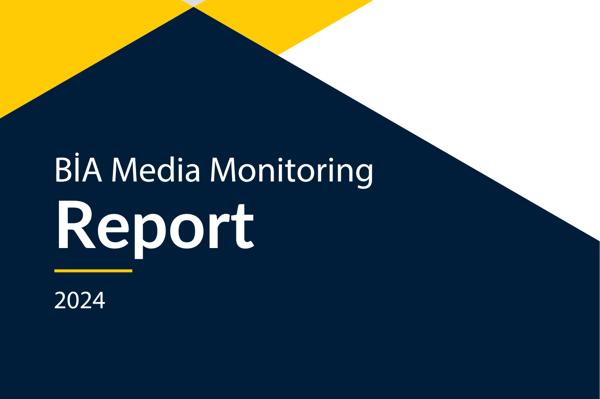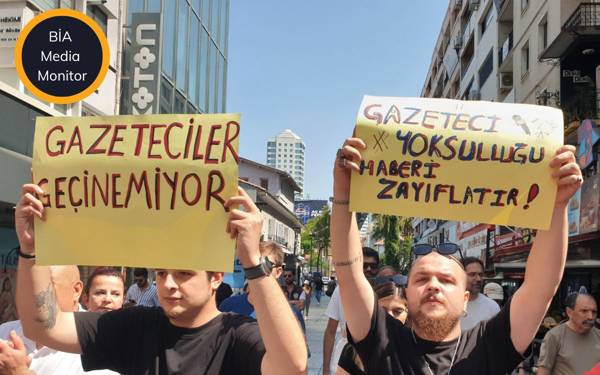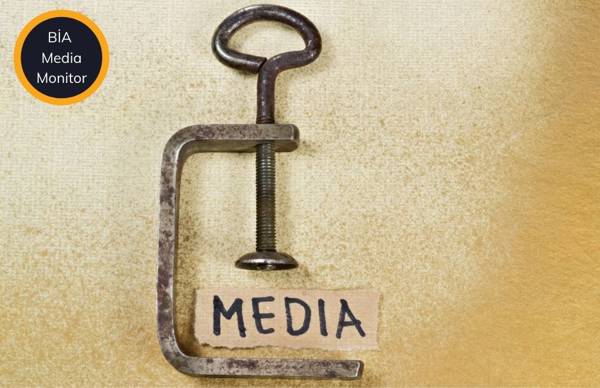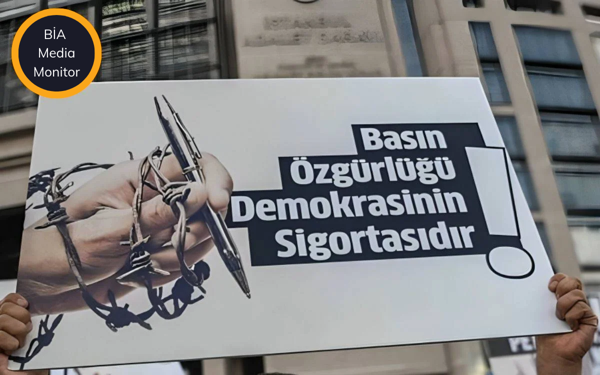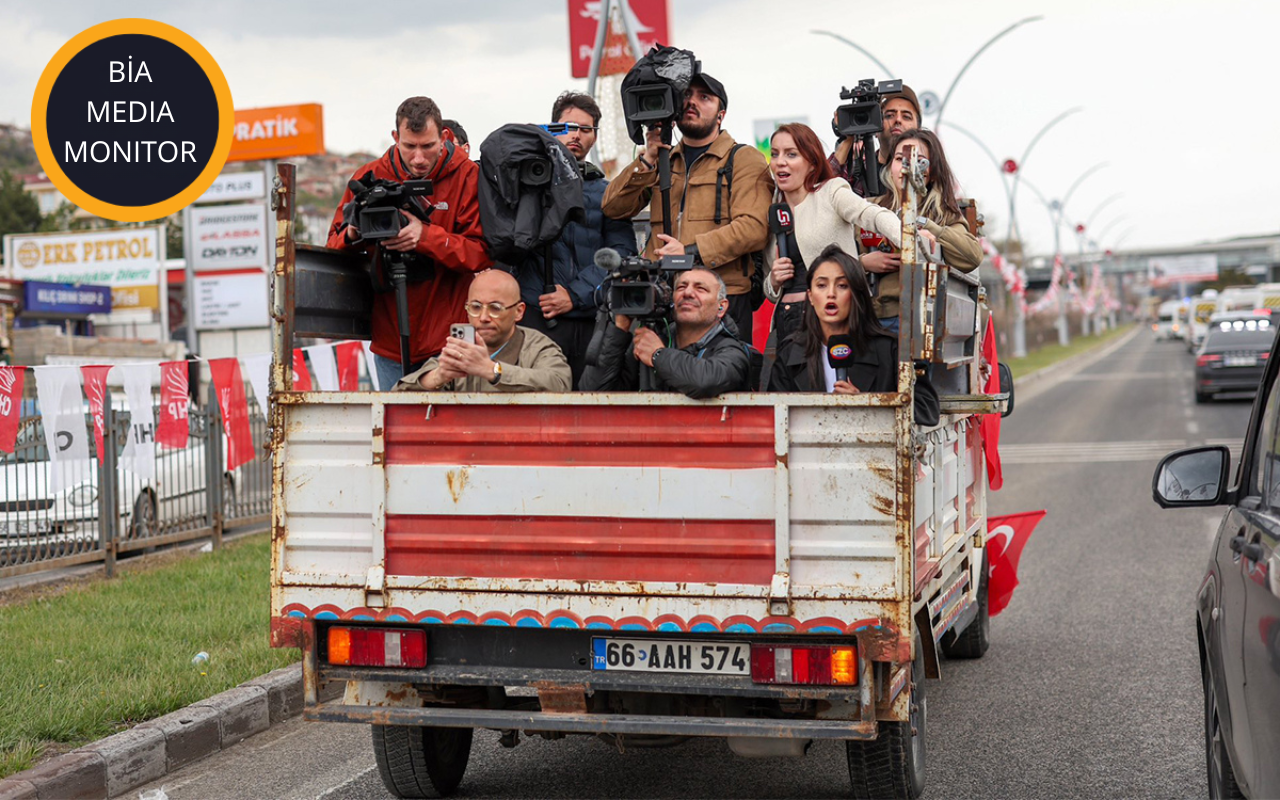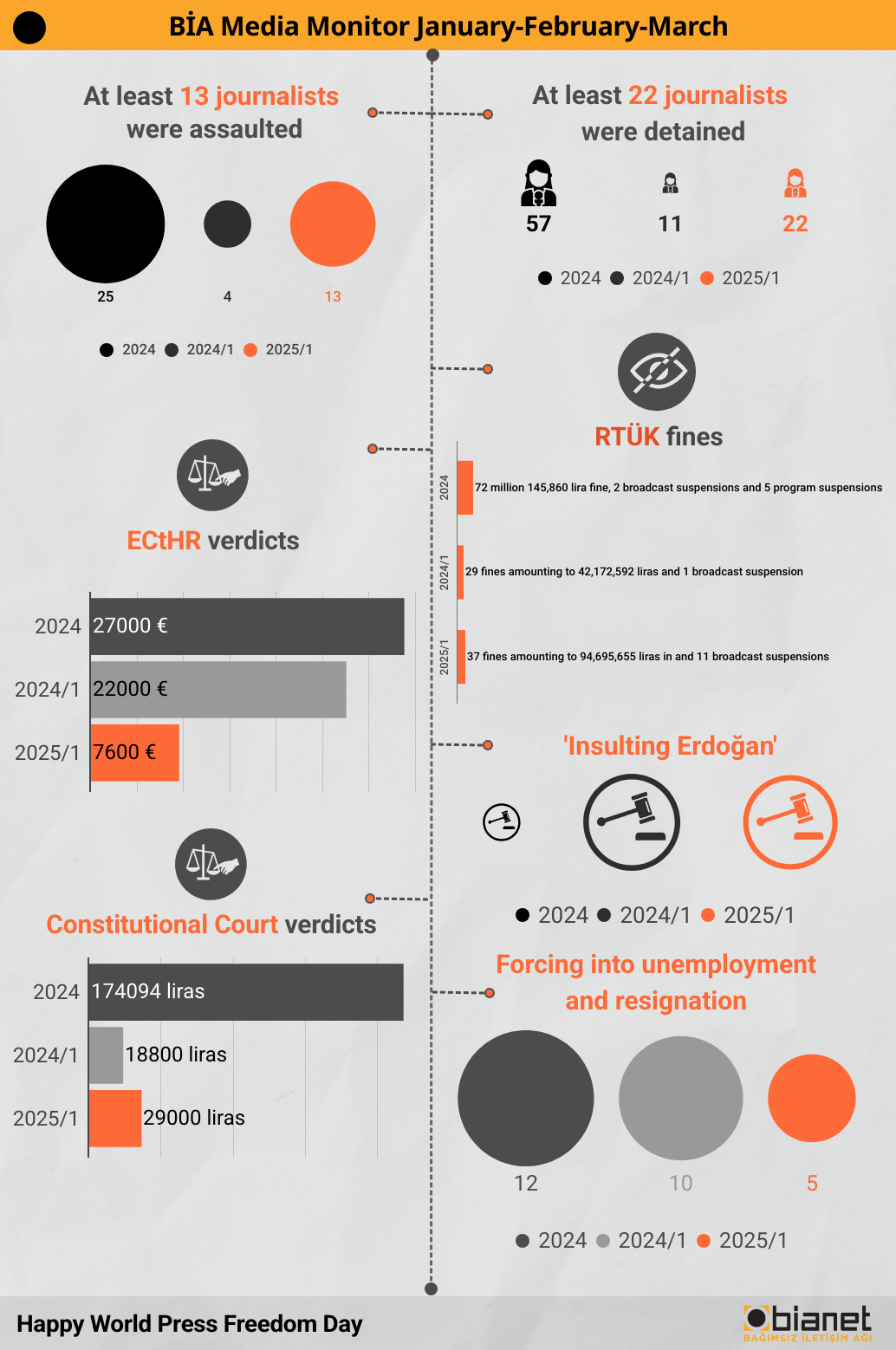
Today is May 3, World Press Freedom Day.
In Turkey, where the government has eliminated judicial independence, the fact that journalists can be arbitrarily arrested at any moment was once again demonstrated when seven media representatives who covered the mass protests that took place during the period when İstanbul Metropolitan Mayor Ekrem İmamoğlu was arrested were imprisoned under the pretense of "deterrence" and the accusation of "violating the Law on Meetings and Demonstrations."
The issue gained international attention once more with the arrest of Swedish journalist Joakim Medin of the newspaper Dagens ETC, on charges of "membership in an armed terrorist organization" and "insulting the president."
The BİA Media Monitoring Report covering the period of January-February-March 2025 shows that influential journalists and critical media outlets are subjected to continuous judicial harassment and that judicial control has become widespread as a new form of "imprisonment." The verdicts of acquittal in the past three months for journalists from Sözcü newspaper, the Vice News team, Halk TV reporters, and journalists such as Murat Çelikkan, Tunca Öğreten, and Murat Baykara, most of whom served prison terms, reveal the arbitrary nature of these prosecutions.
The torment of arrests and house arrests for journalists
Currently, three journalists (Elif Akgül, Yıldız Tar, and Ercüment Akdeniz) have been deprived of their freedom since February 22 as part of an investigation into the Peoples’ Democratic Congress (HDK). In the same investigation, Ender İmrek, who was detained, and investigative journalist İsmail Saymaz, whose journalism activities as a reporter for Radikal newspaper were, after 12 years, included in the Gezi investigation, are under house arrest.
Many Kurdish media representatives are subjected to severe judicial control measures following detention. The house arrest imposed on Özlem Gürses in December 2024 due to her statements on her YouTube channel was lifted after 52 days. The fact that critical television channels are targeted by the judiciary was further evidenced by Halk TV Editor-in-Chief Suat Toktaş’s 34-day detention.
In Turkey, dozens of journalists are under judicial control, described in Reporters Without Borders’ (RSF) 2024 Report as "another anti-democratic and rapidly expanding practice aimed at arbitrarily seizing journalists' freedom of movement and minds," through restrictions such as travel bans and the obligation to sign in regularly.
22 journalists detained: New pretext is the 'demonstration law'
In the last three months, during judicial and police operations especially targeting Halk TV, BirGün, and Van media, at least 22 journalists were detained for various periods.
Journalists covering the mass protests triggered by İmamoğlu’s detention were arbitrarily held in custody for four days, especially in İzmir, on the grounds of "violating the Law on Meetings and Demonstrations."
BBC reporter Mark Lowen, who came to Turkey to cover the protests, was detained and deported on the grounds of "being without accreditation" and "posing a threat to public order."
Six journalists, including Ruşen Takva, who were covering the sit-in protest initiated before the operation targeting Van Metropolitan Municipality, were also detained.
Judicial control has become a common tool for criminalizing journalists in Turkey: In February, Berkant Gültekin and Uğur Koç, Publishing Coordinators of BirGün Newspaper, along with Responsible Editor Yaşar Gökdemir, were detained; Koç and Gökdemir were released on the condition of a travel ban and signing in once a week. Investigative journalist İsmail Saymaz had his passport confiscated, while Halk TV presenter Ece Üner was released under a travel ban and signing obligation.
26 acquittals, 17 convictions in three months
In the first three months of 2025, 26 of the nearly 150 journalists on trial were acquitted, while 17 of them (including Nevşin Mengü, Ali Ergin Demirhan, Kürşat Yılmaz, Görkem Kınacı, Sultan Keleş, İbrahim Aydın, Burkan Karabay, Kazım Güleçyüz...) were sentenced to a total of 25 years, 7 months, and 22 days in prison, and fined 2,610 liras for charges such as “insulting the president,” “insult,” “defamation,” “propaganda for an organization,” “insulting state institutions,” “insulting religious values,” “aiding an organization,” and “membership in an organization.”
This period also marked a time when long-standing cases in İstanbul against employees of Sözcü newspaper and in Diyarbakır against the Vice News team concluded with acquittals, and five reporters from Halk TV were also acquitted at the very first hearing of their trial.
Journalist and rights defender Murat Çelikkan, who had shown symbolic solidarity with the now-shuttered Özgür Gündem newspaper, was also acquitted of charges of “propaganda for a terrorist organization” in a case where he served over two months in prison.
Journalists Tunca Öğreten and Murat Baykara, who were on trial for “encouraging drug use” due to documentaries about the effects of drugs, were also acquitted.
Investigations into those who attend trials or report on them
The opening of investigations into 55 journalists, columnists, and reporters during this three-month period highlights the extent to which critical journalism is under intense judicial scrutiny.
Acting on behalf of Cengiz Holding, Mehmet Cengiz, who came under the spotlight over public tenders and allegations of environmental destruction, filed criminal complaints against 26 journalists and columnists working for Sözcü newspaper and its affiliated website.
Twenty-one journalists who covered the Kobanî trial, in which former HDP Co-Chairs Selahattin Demirtaş and Figen Yüksekdağ are also being prosecuted, are facing investigations as well.
Insulting the President: Swedish journalist and 19 defendants
After the cases of Deniz Yücel and Charlie Hebdo, arbitrary trials against journalists under the charge of “insulting the president” have once again gained international attention. This time, the arrest of Swedish journalist Joakim Medin, a reporter for Dagens ETC, upon entering Turkey on March 27 brought the issue to the fore once again.
Additionally, in the past three months, at least 19 journalists and cartoonists (Barış Pehlivan, Ozan Alper Yurtoğlu, Deniz Yücel, Ahmet Sever, Levent Gültekin, Sedef Kabaş, Hayko Bağdat, Baransel Ağca, Çiğdem Akbayrak, Erk Acarer, Julien Serignac, Gerard Biard, Laurent Sourisseau, “Alice,” Ramazan Yurttapan, Haydar Ergül, Sultan Keleş, Furkan Karabay (2), and Rüstem Batum) have been involved in cases based on accusations of “insulting the president.”
In the last 10 years, 78 journalists have been convicted under Article 299 of the Turkish Penal Code. In the past three months, journalists prosecuted under this article faced a total of 88 years and 8 months in prison. While Levent Gültekin and Çiğdem Albayrak were acquitted, Sultan Keleş was sentenced to 1 year and 2 months in prison.
The file of journalist Ahmet Seven, who had lived for years under the threat of imprisonment due to his book “İçimde Kalmasın/Tanıklığımdır,” will be closed due to his passing.
13 assaults: Journalists became 'special targets'
In the past three months, at least 13 journalists were assaulted; 12 of these assaults originated from security forces during public demonstrations.
In Diyarbakır, bianet reporter Evrim Deniz was targeted with sexist and racist remarks on social media because of a photo she took at the March 8 International Women’s Day rally.
Investigative journalist and author Murat Ağırel, who previously reported that his home was being watched and his trash rummaged through because he pursued the Sinan Ateş assassination, justice issues, and corruption claims, stated, “This time, not just me, but my whole family is targeted.”
Broadcast bans, bandwidth throttling, access blocks…
The Constitutional Court, which abolished the arbitrary online censorship regulation enacted on October 10, 2024, on the grounds of “violating personal rights,” received another application related to access blocks. This came after the Information and Communication Technologies Authority (BTK) banned hundreds of accounts, including those of journalists Metin Cihan, Hayko Bağdat, Erk Acarer, and the news site Artı Gerçek. The application was submitted by the company X.
In the last three months, a broadcast ban was imposed concerning the fire at Bolu Kartalkaya Grand Kartal Hotel, which resulted in the deaths of dozens of people. After the detention of İstanbul Mayor Ekrem İmamoğlu, the Presidency requested the throttling of social media platforms such as X, YouTube, Instagram, Facebook, TikTok, Telegram, Signal, and WhatsApp, resulting in a 42-hour-wide intervention affecting all of İstanbul.
One conviction from the Constitutional Court, two new applications
In this three-month period, the Constitutional Court ruled that the rights to freedom of expression and press of Aydın Gelleci, Günebakış newspaper's managing editor responsible for legal affairs, were violated after he was forced to publish a retraction. The court ordered the state to pay the journalist 29,000 liras, including court expenses.
In the same period, a new application was filed with the Constitutional Court regarding the unlawful detention of Yıldız Tar, Editor-in-Chief of KaosGL.org news site. Another application was submitted concerning the unlawful seizure of journalist Erdoğan Alayumat’s digital materials.
ECtHR ruled in favor of TRT cameraman
In the past three months, the European Court of Human Rights (ECtHR) issued one ruling related to journalistic rights: the dismissal of TRT chief cameraman Binali Erdoğan from public service on charges of “insulting the president” was deemed a “violation of freedom of thought and expression.” The court ruled that Erdoğan be paid 7,600 euros in compensation.
RTÜK imposes unprecedentedly harsh penalties
The Radio and Television Supreme Council (RTÜK) imposed a total of 37 administrative fines and 11 broadcast suspension penalties on TV stations during the January-February-March 2025 period for their news and program broadcasts. The total administrative fines amounted to 94,695,655 liras. RTÜK did not issue any penalties to radio stations during this reporting period.
RTÜK, which the opposition describes as the “government’s stick,” targeted national channels critical of the government such as NOW TV, Tele 1, Halk TV, and SZC TV with unprecedentedly heavy sanctions over their coverage of the investigation, detention, and arrest processes involving İstanbul Mayor Ekrem İmamoğlu and the mass protests that followed. During this process, SZC TV received a 10-day broadcast suspension.
While RTÜK Chair Ebubekir Şahin remained silent on broadcasts that portrayed or smeared the mass protests negatively, he openly threatened channels critical of the government via his social media account. By using broadcast bans as a tool to harass broadcasting activities, he directly interfered with broadcasts and positioned himself almost as an editor-in-chief.
Five journalists resign from Halk TV
Over the past three months, dozens of journalists at various media outlets lost their jobs due to economic reasons, and a significant departure also occurred at Halk TV.
Şule Aydın, Barış Pehlivan, Murat Ağırel, Timur Soykan, and Barış Terkoğlu left Halk TV as the “Kayda Geçsin” team following an editorial dispute with management that arose after an interview with Rasim Ozan Kütahyalı was published on the channel’s YouTube account. (EÖ/VK)






